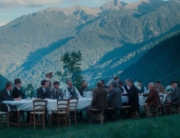
Andrei Konchalovsky’s Dear Comrades! runs through a catastrophically eventful day in the life of a rigid Communist Party official who is as swaddled in ideology as newborn Russian babies are famously bound up in movement-inhibiting blankets. This once flamboyant director, maker of the raw B movie Runaway Train, uses a stark black-and-white palette and tightly composed symmetrical shots to reflect a rigid Soviet mindset that keeps its dwellers trapped. But the alarming events he unfurls are based on a true story, and the contrast between Konchalovsky’s formal control and a sense of things falling rapidly apart creates a fascinating tension.
Lyuda (Julia Vysotskaya, who is married to Konchalovsky) kicks off her routine morning, hastily dressing after a night with a dour (and married) party member and arranging herself into an upright, bureaucratic figure. Although it’s 1962 and Khrushchev is supposedly relaxing the state’s grip on the country, Lyuda misses Stalin and good old-fashioned repression, and dogmatically recites commie jargon before her first cup of coffee or tea. At home, she exchanges unfriendly words with her sassy teen daughter and her bitter, aging veteran dad, both of whom she regards as ungrateful for the party’s sacrifices. Hundreds of hungry consumers are restively lined up for food outside a cooperative, but apparatchik Lyuda scoots behind the scenes to hoard prized delicacies like salami and Latvian cheese. After a little double-talk and some low-level scamming, Lyuda breezes past the two babushkas who hang out by the apartment door. It’s a day like any another.
Until it isn’t. A pompous party meeting is interrupted first by an urgent phone call, then the sound of sirens. Apparently, the people in line do not appreciate price hikes and food shortages, and are erupting in protest. (The rebellion enacted here is based on a real-life insurrection in the southern provincial city of Novocherkassk in which Russian police and Red Army forces shot and killed up to 80 unarmed strikers.) Soon rocks are smashing windows. With deadpan satire, Konchalovsky makes these party prigs, toadies, and stuffed shirts scramble for undignified, uncomfortable cover in sewer-pipe crawl spaces and cloakrooms. An army investigation of the uprising soon sets off a dire blame game that will strip bigwigs of authority, including Lyuda.
Conflict escalates and rumors fly. Lyuda embarks on a quest with a reluctant comrade to find her daughter missing in the mayhem. The journey becomes a harrowing trip through danger, strange coincidences, and a kind of purgatory of unknowing—the scariest state of all for know-it-all Lyuda. The ass covering the haughty functionary encouraged and the rank she pulled now turn against her, but there’s little pleasure in the cosmic payback. The lies and denial are still too thick for that. As her world is exposed as a repressive, hated place instead of the beloved communist utopia she strives for, Lyuda clings to the only beliefs she has.
Many critics have strained to interpret this period piece’s political messages to mean something about the world today, but there’s no need to. Mass zealotry and the grim past and future it creates for Lyuda and her compatriots are disquieting enough. Konchalovsky uses meticulous framing and steady pace to reexamine this timeless truth: the first lie in a million lies, after all, is to one’s self.






Leave A Comment